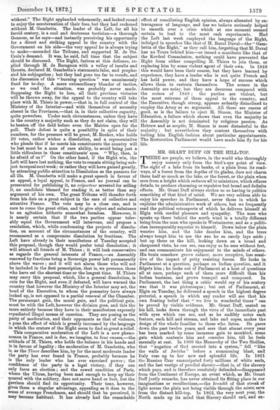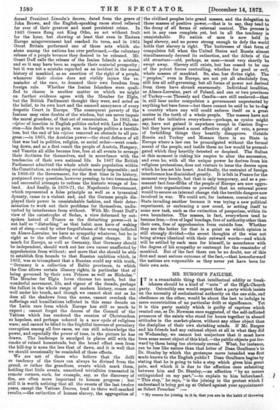MR. GRANT DUFF ON THE HILL-TOP.
RE are people, we believe, in the world who thoroughly enjoy scenery only from the bird's-eye point of view. The sight of a lake from its banks, of a plain from its road- ways, of a forest from the depths of its glades, does not charm them half so much as the lake, or the forest, or the plain when seen from a height which reduces all to miniature, which effaces details, to produce charming or repulsive but broad and definite effects. Mr. Grant Duff always strikes us as having in politics something of that kind of mind. We are very seldom able to enjoy his speeches in Parliament, never those in which he explains the administrative work of others, but we frequently read the political retrospects of which he delivers himself at Elgin with cordial pleasure and sympathy. The man who speaks up there behind the north wind is a totally different being from the man who speaks in Westminster, and as a politi- cian incomparably superior to himself. Down below the plain wearies him, and the lake dazzles him, and the trees always tempt him to use the axe he so rarely lays aside ; but up there on the hill, looking down on a broad and chequered vista, he can see, can enjoy as he sees without fret, and can communicate his enjoyment to the minds of others. His brain somehow grows calmer, more receptive, less sensi- tive of the impact of petty resisting forces. He looks in Parliament at a question, perhaps an Indian question, and it fidgets him ; he looks out of Parliament at a host of questions all at once, perhaps each of them more difficult than his
Indian business, and grows tranquil and composed. In Parliament, the last thing a critic would say of his oratory was that it was picturesque ; but out of Parliament, at Elgin on Tuesday, he delivered a speech in the highest degree pictorial, a speech in which any reader will see that his own floating belief that " we live in wonderful times " can be proved by visible evidence. Mr. Grant Duff, seated on his hill, looks down through the vista of the immediate past with eyes which can see, and as he audibly notes each feature, each hill and stream, and lake and copse, makes the design of the whole familiar to those who listen. He gazes down the past twelve years, and sees that almost every year has been marked by some immense gain to mankind, some gain which contents him and consoles him, till he feels mentally at rest. In 1860 the Monarchy of the Two Sicilia, that "negation of God erected into a system," fell "like the walls of Jericho " before a summoning blast, and Italy rose up to her new and splendid life. In 1861 the Russian Czar emancipated forty millions of white serfs, and the last vestige of pradial slavery—that is, of the slavery which pays, and is therefore resolutely defended—disappeared from the Continent of Europe, an event which, as Mr. Grant Duff justly remarks, has never obtained its fitting place in our imaginations or recollections,—the breadth of that streak of light across the plain not being visible through the mists; save from the distant hill-top. In 1862, the very next year, the North made up its mind that Slavery should end, and en-
dorsed President Lincoln's decree, dated from the grave of John Brown, and the English-speaking races stood relieved for ever of their greatest and most persistent crime. In 1863 Greece flung out King Otho, an act without fruit for the hour, but showing at least that even in Eastern Europe misgovernment had reached its term, and in 1864 Great Britain performed one of those acts which she alone among the nations has ever performed,—the voluntary release of a people because they desired to be released. Mr. Grant Duff calls the release of the Ionian Islands a mistake, and so it may have been as regards their material prosperity ; but it was not a mistake regarded as an incident in the moral history of mankind, as an assertion of the right of a people, whenever their choice does not visibly injure the re- mainder of the race, to demand their own freedom from
foreign rule. Whether the Ionian Islanders were quali- fied to choose is another matter on which we might on further evidence agree with the Member for Elgin, but the British Parliament thought they were, and acted on the belief, to its own hurt and the amazed annoyance of every despotic Court in Europe. The consequent poverty of the Ionians may raise doubts of the wisdom, but can never impair the moral grandeur, of that act of renunciation. In 1865, the regime of inaction in English politics ended with Lord Palmer- ston—his death was no gain, was in foreign politics a terrible loss, but the end of his regime removed an obstacle to all pro- gress ;—in 1866, the Austrian power—the stout defence of all that was bad in politics, religion, or social order—went crash- ing down, and as a first result the people of Austria, Hungary, and Venetia all alike became free, free at all events to arrange their destinies for themselves, and in accordance with the tendencies of their own national life. In 1867 the British Parliament admitted the whole adult male population within the Constitution, so rendering revolution nearly impossible ; and in 1868-69 the Government, for the first time in its history, postponed every question, however pressing, to two tremendous and successful attempts to redress the historic wrongs of Ire- land. And finally, in 1870-71, the Napoleonic Government, which represented a false principle as well as a tyrannical dynasty, came to a violent end, and the German people dis- played their power in unmistakable fashion, and their deter- mination to work out their problems for themselves, undis- turbed by interference from without. With Mr. Grant Duff's view of the catastrophe of Sedan, a view deformed by out- spoken hatred of France as the disturbing power—it is not half so " disturbing " as that habit men have of waking
out of sleep,—and by utter forgetfulness of the wrong inflicted on Alsace-Lorraine, we have no sympathy whatever, but he is right as to the other effects of that great change. It is much for Europe, as well as Germany, that Germany should be independent, should work out her own career unaffected by apprehension from without; and more that she should be able to establish firm bounds to that Russian ambition which, in 1852, was so triumphant that a Russian could say with truth, " Germany is a collection of Baltic provinces, to which the Czar allows certain illusory rights, in particular that of being governed by their own Princes as well as Nicholas."
The Member for Elgin loves chrome too much, but the wonderful movement, life, and vigour of the decade, perhaps the fullest in the whole range of modern history, comes out well under his touch, and though we cannot shut out as he does all the shadows from the scene, cannot overlook the sufferings and humiliations inflicted in this same decade on the Latin race from which Europe has still so much to expect ; cannot forget the decree of the Council of the Vatican which has rendered the reunion of Christendom so hopeless, and perhaps ushered in a new cycle of religious wars; and cannot be blind to the frightful increase of pecuniary corruption among all free races, we can still acknowledge the power, and especially the power of tone, in the picture he has drawn. The landscape is smudged in places still with the smoke of ruined homesteads, but the broad effect seen from the hill-top is none the less that of dawn, and it is well that we should occasionally be reminded of these effects.
We are not of those who believe that the drift or tendency of the times can always be divined from the grand, or rather the grandiose, events which mark them, holding that little events, unnoticed trivialities transacted in remote corners, such, for example, say, as the discovery of fire, are often more important to human progress ; but still it is worth noticing that all the events of the last twelve years, except the Vatican Decree, tend to three well-marked results,—the extinction of human slavery, the aggregation of the civilised peoples into grand masses, and the delegation to those masses of positive power,—that is to say, they tend to the decay of all forms of external control. The process is not in any case complete yet, but in all the tendency is unmistakable. No nation of men is now held in legal slavery, and no power strong enough to defy the world holds that slavery is right. The buttresses of that form of compulsion fell when the United States and Russia almost simultaneously decreed its extinction, and the d4bris of the old structure—old, perhaps, as man—must very shortly be swept away. Slavery still exists, but has ceased to be one of the potent forces controlling, whether for good or evil, whole masses of mankind. So, also, has divine right. The " peoples," even in Europe, are not yet all absolutely free, still less all self-governing, but all forms of power not derived from them have shrunk enormously. Individual localities, as Alsace-Lorraine, part of Poland, and one or two provinces of Turkey—as Thessaly and Candia—are still enslaved—that is, still bear under compulsion a government unprotected by anything but bare force—but there cannot be said to be to-dal a country where any will could enforce itself on a great matter in the teeth of a whole people. The masses have not gained the initiative everywhere—perhaps, as cynics might say, have not gained it anywhere except in Canton Zug— but they have gained a most effective right of veto, a power of forbidding things they heartily disapprove. Outside Russia and Turkey and Monaco there is no State in Europe where a law can be promulgated without the formal assent of the people, and inside them no law would be promul- gated which they heartily detested or despised. The Sultan at this moment is risking his empire to alter the succession, and even he, with all the unique power he derives from his religious pretensions, does not venture to issue the decree upon which he has set his heart. And finally, the restraint of foreign interference has diminished greatly. It is felt in France for the moment very keenly, but that is only temporary, and as a per- manent fact four-fifths of the people of Europe are now aggre- gated into organizations so powerful that no external power would to secure an internal change risk the terrible dangers now involved in war. We could not, for instance, conceive of one State invading another because it was trying a new political experiment, or embracing a new creed, or setting itself to some new task, such as the extinction of pauperism, within its own boundaries. The masses, in fact, everywhere tend to become free,—free of legal bondage, free of authority other than their own, free of apprehension from outside foes. Whether they are the better for that is a point on which opinion is still strongly divided—the secret thoughts of the wise not being always identical with their outward words—and which will be settled by each man for himself, in accordance with the degree of his sympathy or contempt for the remainder of mankind. But of the fact there can be no doubt, nor of this first and most serious outcome of the fact,—that henceforward the nations are responsible as they never yet have been for their own acts.











































 Previous page
Previous page